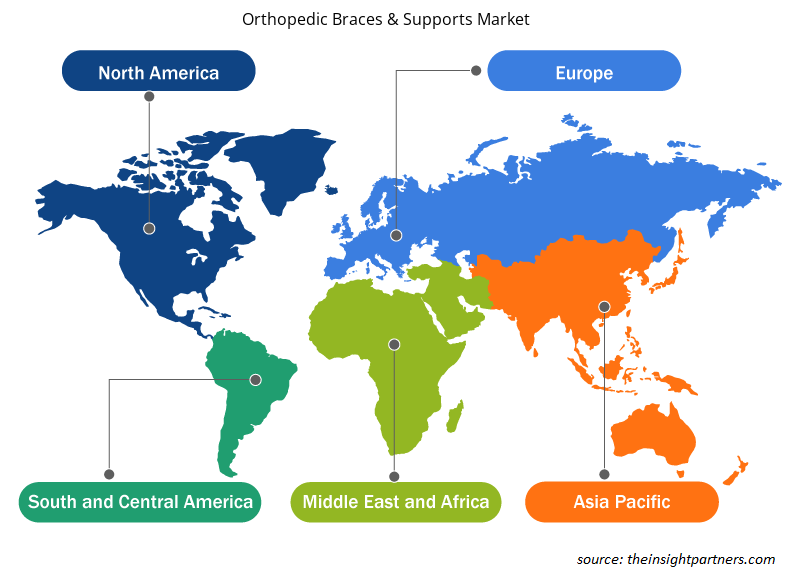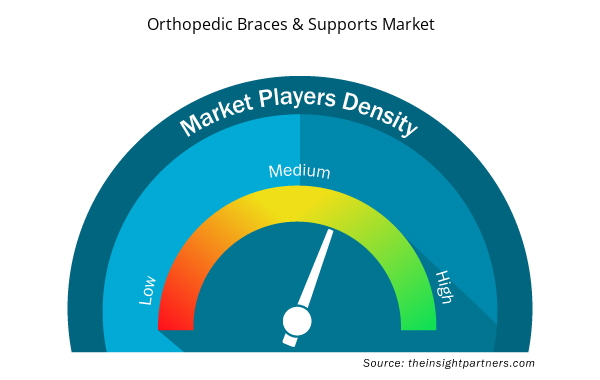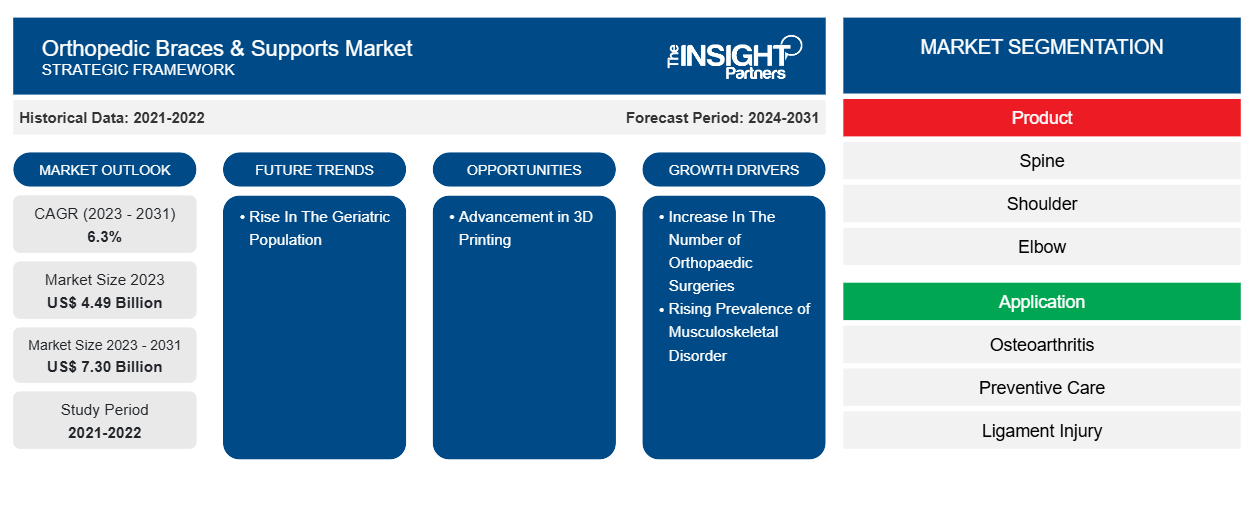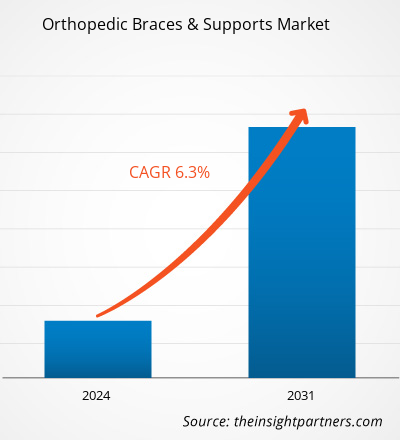Der Markt für orthopädische Stützen und Bänder soll von 4,49 Milliarden US-Dollar im Jahr 2023 auf 7,30 Milliarden US-Dollar im Jahr 2031 anwachsen. Der Markt wird zwischen 2023 und 2031 voraussichtlich eine durchschnittliche jährliche Wachstumsrate (CAGR) von 6,3 % verzeichnen. Technologische Entwicklungen wie die Einführung anatomischer Modellierungssoftware und hypoallergener Materialien für eine verbesserte Genauigkeit und Effizienz des Produktdesigns werden voraussichtlich weiterhin wichtige Trends auf dem Markt bleiben.
Analyse orthopädischer Schienen und Stützen
Der Markt für orthopädische Schienen und Stützen wird durch technologische Verbesserungen, eine Zunahme der Anzahl von Sport- und Unfallverletzungen, einen Anstieg der geriatrischen Bevölkerung und ein wachsendes öffentliches Bewusstsein für vorbeugende Behandlungen vorangetrieben. Diese Variablen tragen dazu bei, kreative Produkte und Lösungen zu entwickeln, die die Behandlungsergebnisse für Patienten verbessern. Laut dem Population Reference Bureau würde beispielsweise die Zahl der Menschen im Alter von 65 Jahren und älter in den USA von 58 Millionen im Jahr 2022 auf 82 Millionen im Jahr 2050 steigen. Die Einbindung orthopädischer Beratungen und Geräteempfehlungen in Telemedizinplattformen sowie die Nachfrage nach personalisierten orthopädischen Schienen und Stützen stellen eine wachsende Chance dar.
Orthopädische Orthesen & Stützen Übersicht
Die orthopädischen Schienen und Stützprodukte werden zur Rehabilitation nach Verletzungen, zur Vorbeugung von Verletzungen, zur Behandlung von Osteoarthritis, zur postoperativen Behandlung und mehr verwendet. Die Schienen und Stützen sind in Form von Knieschienen , Knöchelschienen, Beinschienen, Ellenbogenschienen, Tennisarmschienen, Handgelenkschienen, Daumen- und Handschienen, Nacken-, Rücken- und Schulterschienen und mehr erhältlich. Darüber hinaus verwenden Sportler regelmäßig orthopädische Schienen, um Verletzungen vorzubeugen und den Genesungsprozess zu unterstützen. Die zunehmende Präferenz der Patienten für nicht-invasive Behandlungsoptionen gegenüber Operationen treibt die Produktnachfrage in die Höhe und bietet eine nicht-chirurgische Lösung für eine breite Palette von Erkrankungen des Bewegungsapparats. Laut CDC sind über 32,5 Millionen Erwachsene in den USA von Osteoarthritis betroffen. Schienen für Osteoarthritis können helfen, Symptome, Mobilität, Funktion und Lebensqualität zu verbessern.
Passen Sie diesen Bericht Ihren Anforderungen an
Sie erhalten kostenlos individuelle Anpassungen an jedem Bericht, einschließlich Teilen dieses Berichts oder einer Analyse auf Länderebene, eines Excel-Datenpakets sowie tolle Angebote und Rabatte für Start-ups und Universitäten.
- Holen Sie sich die wichtigsten Markttrends aus diesem Bericht.Dieses KOSTENLOSE Beispiel umfasst eine Datenanalyse von Markttrends bis hin zu Schätzungen und Prognosen.
Orthopädische Zahnspangen und Stützen – Treiber und Chancen
Steigende Prävalenz von Muskel-Skelett-Erkrankungen begünstigt den Markt
Die zunehmende Verbreitung von Erkrankungen des Bewegungsapparats sowie die wachsende geriatrische Bevölkerung treiben die Nachfrage nach orthopädischen Eingriffen in die Höhe. Laut einem Artikel im Journal of Orthopaedic Science vom September 2021 werden beispielsweise in Japan bis 2030 etwa 4052 Kniearthroplastiken an Männern im Alter von 40 bis 64 Jahren, 6942 an Männern im Alter von 65 bis 74 Jahren und 14.986 an Männern ab 75 Jahren durchgeführt. Darüber hinaus wurden in den USA laut dem National Safety Council im Jahr 2022 etwa 440.000 Verletzungen durch Sport und Trainingsgeräte gemeldet. Der prognostizierte Anstieg der Hüft- und Knieoperationen in der Bevölkerung erhöht also die Nachfrage nach Schienen und Stützen, die den Patienten beim Gehen helfen, und treibt den Markt voran.
Fortschritte im 3D-Druck
Fortschritte im 3D-Druck und in digitalen Scantechnologien haben es möglich gemacht, individuell angepasste orthopädische Geräte zu entwerfen, die auf die Anatomie und Bedürfnisse des Patienten zugeschnitten sind. Gesundheitsfachkräfte verwenden digitale Scans der Wirbelsäule eines Patienten, um detaillierte 3D-Modelle zu erstellen, die den Druckprozess steuern. Die Personalisierung verbessert den Patientenkomfort und die Behandlungsergebnisse und bietet damit eine enorme Geschäftschance.
Segmentierungsanalyse des Berichts über orthopädische Zahnspangen und Stützen
Wichtige Segmente, die zur Ableitung der Analyse orthopädischer Schienen und Stützen beigetragen haben, sind Produkt und Anwendung.
- Basierend auf dem Produkt sind die orthopädischen Stützen und Bandagen in Knie, Rücken und Hüfte, Schulter, Ellbogen, Fuß sowie Knöchel und Wirbelsäule unterteilt. Das Kniesegment hatte im Jahr 2023 den größten Marktanteil.
- Nach Anwendung ist der Markt in Bänderverletzungen, Arthrose, vorbeugende Pflege, Kältebandagen und andere unterteilt. Das Segment Bänderverletzungen hatte im Jahr 2023 den größten Marktanteil.
Orthopädische Schienen und Stützen – Marktanteilsanalyse nach geografischer Lage
Der geografische Umfang des Berichts über orthopädische Zahnspangen und Stützen ist hauptsächlich in fünf Regionen unterteilt: Nordamerika, Asien-Pazifik, Europa, Naher Osten und Afrika sowie Süd- und Mittelamerika.
Nordamerika dominiert den Markt. Das Marktwachstum in der Region ist auf die zunehmende geriatrische Bevölkerung, die zunehmende Entwicklung der Marktteilnehmer für orthopädische Stützen und Bänder, das wachsende Bewusstsein für die Produktverfügbarkeit und die zunehmende Verwendung orthopädischer Stützen zurückzuführen, um Mobilität zu bieten und weiteren Verletzungen des Bandes vorzubeugen.
Berichtsumfang zu orthopädischen Schienen und Stützen
Regionale Einblicke in den Markt für orthopädische Schienen und Stützen
Die regionalen Trends und Faktoren, die den Markt für orthopädische Stützen und Bänder im Prognosezeitraum beeinflussen, wurden von den Analysten von Insight Partners ausführlich erläutert. In diesem Abschnitt werden auch die Marktsegmente und die Geografie für orthopädische Stützen und Bänder in Nordamerika, Europa, im asiatisch-pazifischen Raum, im Nahen Osten und Afrika sowie in Süd- und Mittelamerika erörtert.

- Erhalten Sie regionale Daten zum Markt für orthopädische Zahnspangen und Stützen
Umfang des Marktberichts zu orthopädischen Zahnspangen und Stützen
| Berichtsattribut | Details |
|---|---|
| Marktgröße im Jahr 2023 | 4,49 Milliarden US-Dollar |
| Marktgröße bis 2031 | 7,30 Milliarden US-Dollar |
| Globale CAGR (2023 - 2031)CAGR (2023 - 2031) | 6,3 % |
| Historische Daten | 2021-2022 |
| Prognosezeitraum | 2024–2031 |
| Abgedeckte Segmente | Nach Produkt
|
| Abgedeckte Regionen und Länder | Nordamerika
|
| Marktführer und wichtige Unternehmensprofile |
|
Marktteilnehmerdichte für orthopädische Schienen und Stützen: Auswirkungen auf die Geschäftsdynamik verstehen
Der Markt für orthopädische Schienen und Stützen wächst rasant. Die Nachfrage der Endverbraucher steigt aufgrund von Faktoren wie sich entwickelnden Verbraucherpräferenzen, technologischen Fortschritten und einem größeren Bewusstsein für die Vorteile des Produkts. Mit der steigenden Nachfrage erweitern Unternehmen ihr Angebot, entwickeln Innovationen, um die Bedürfnisse der Verbraucher zu erfüllen, und nutzen neue Trends, was das Marktwachstum weiter ankurbelt.
Die Marktteilnehmerdichte bezieht sich auf die Verteilung der Firmen oder Unternehmen, die in einem bestimmten Markt oder einer bestimmten Branche tätig sind. Sie gibt an, wie viele Wettbewerber (Marktteilnehmer) in einem bestimmten Marktraum im Verhältnis zu seiner Größe oder seinem gesamten Marktwert präsent sind.
Die wichtigsten auf dem Markt für orthopädische Zahnspangen und Stützen tätigen Unternehmen sind:
- DJO Global
- Zimmer Biomet
- Ossur Unternehmen
- 3M
- Breg Inc.
- Bauerfeind
Haftungsausschluss : Die oben aufgeführten Unternehmen sind nicht in einer bestimmten Reihenfolge aufgeführt.

- Überblick über die wichtigsten Akteure auf dem Markt für orthopädische Zahnspangen und Stützen
Orthopädische Schienen und Stützen – Neuigkeiten und aktuelle Entwicklungen
Die orthopädischen Stützen und Bänder werden durch die Erhebung qualitativer und quantitativer Daten aus Primär- und Sekundärforschung bewertet, die wichtige Unternehmensveröffentlichungen, Verbandsdaten und Datenbanken umfasst. Nachfolgend sind einige der Entwicklungen im Bereich der orthopädischen Stützen und Bänder aufgeführt:
- OrthoPediatrics Corp. hat Boston Orthotics & Prosthetics übernommen. Diese Übernahme ermöglicht es OrthoPediatrics Corp, mehr Patienten zu versorgen, als Erweiterung unserer Wachstumsstrategie, um den Kunden der Kinderorthopädie das umfassendste Portfolio an Geräten zur Behandlung von Kindern anzubieten (Quelle: OrthoPediatrics Corp, Pressemitteilung, Januar 2024)
- dj Orthopedics, Inc. hat ein neues, multifunktionales Rückenstützsystem auf den Markt gebracht, das BOA (Back Orthotic Appliance). Das BOA ist für eine Vielzahl klinischer Wirbelsäulenindikationen konzipiert, darunter die postoperative Unterstützung nach Wirbelsäulenversteifung und Wirbelsäulenlaminektomie, akute und
- chronische Schmerzen im unteren Rücken und Bandscheibenvorfall oder -degeneration. (Quelle: dj Orthopedics Inc, Pressemitteilung, September 2022)
Bericht über orthopädische Schienen und Stützen - Umfang und Ergebnisse
Der Bericht „Orthopädische Zahnspangen und Stützen – Größe und Prognose (2021–2031)“ bietet eine detaillierte Analyse des Marktes, die die folgenden Bereiche abdeckt:
- Orthopädische Zahnspangen und unterstützt Marktgröße und Prognose auf globaler, regionaler und Länderebene für alle wichtigen Marktsegmente im Rahmen
- Orthopädische Schienen und Stützen Markttrends sowie Marktdynamik wie Treiber, Einschränkungen und wichtige Chancen
- Detaillierte PEST/Porters Five Forces- und SWOT-Analyse
- Analyse orthopädischer Schienen und Stützen, die wichtige Markttrends, globale und regionale Rahmenbedingungen, wichtige Akteure, Vorschriften und aktuelle Marktentwicklungen abdeckt
- Branchenlandschaft und Wettbewerbsanalyse, die die Marktkonzentration, Heatmap-Analyse, prominente Akteure und aktuelle Entwicklungen für orthopädische Zahnspangen und Stützen umfasst
- Detaillierte Firmenprofile
- Historische Analyse (2 Jahre), Basisjahr, Prognose (7 Jahre) mit CAGR
- PEST- und SWOT-Analyse
- Marktgröße Wert/Volumen – Global, Regional, Land
- Branche und Wettbewerbsumfeld
- Excel-Datensatz


- Print Management Software Market
- Diaper Packaging Machine Market
- Asset Integrity Management Market
- 3D Mapping and Modelling Market
- Long Read Sequencing Market
- Airline Ancillary Services Market
- Single-Use Negative Pressure Wound Therapy Devices Market
- Extracellular Matrix Market
- Oxy-fuel Combustion Technology Market
- Data Center Cooling Market

Report Coverage
Revenue forecast, Company Analysis, Industry landscape, Growth factors, and Trends

Segment Covered
This text is related
to segments covered.

Regional Scope
North America, Europe, Asia Pacific, Middle East & Africa, South & Central America

Country Scope
This text is related
to country scope.
Häufig gestellte Fragen
The market is estimated to grow at a CAGR of 6.3% during 2023–2031.
The estimated value of the market by 2031 will be US$ 7.30 billion.
DJO Global and Zimmer Biomet are the leading players operating in the intermittent catheters market.
Adoption of anatomical modelling software and hypoallergenic materials is likely to act as trends in the market in the future.
The rising prevalence of musculoskeletal disorder, increase in the number of sports and accident-related injuries, and a rise in the geriatric population are the factors bolstering the market.
North America dominated the market in 2023.
Trends and growth analysis reports related to Life Sciences : READ MORE..
The Insight Partners performs research in 4 major stages: Data Collection & Secondary Research, Primary Research, Data Analysis and Data Triangulation & Final Review.
- Data Collection and Secondary Research:
As a market research and consulting firm operating from a decade, we have published and advised several client across the globe. First step for any study will start with an assessment of currently available data and insights from existing reports. Further, historical and current market information is collected from Investor Presentations, Annual Reports, SEC Filings, etc., and other information related to company’s performance and market positioning are gathered from Paid Databases (Factiva, Hoovers, and Reuters) and various other publications available in public domain.
Several associations trade associates, technical forums, institutes, societies and organization are accessed to gain technical as well as market related insights through their publications such as research papers, blogs and press releases related to the studies are referred to get cues about the market. Further, white papers, journals, magazines, and other news articles published in last 3 years are scrutinized and analyzed to understand the current market trends.
- Primary Research:
The primarily interview analysis comprise of data obtained from industry participants interview and answers to survey questions gathered by in-house primary team.
For primary research, interviews are conducted with industry experts/CEOs/Marketing Managers/VPs/Subject Matter Experts from both demand and supply side to get a 360-degree view of the market. The primary team conducts several interviews based on the complexity of the markets to understand the various market trends and dynamics which makes research more credible and precise.
A typical research interview fulfils the following functions:
- Provides first-hand information on the market size, market trends, growth trends, competitive landscape, and outlook
- Validates and strengthens in-house secondary research findings
- Develops the analysis team’s expertise and market understanding
Primary research involves email interactions and telephone interviews for each market, category, segment, and sub-segment across geographies. The participants who typically take part in such a process include, but are not limited to:
- Industry participants: VPs, business development managers, market intelligence managers and national sales managers
- Outside experts: Valuation experts, research analysts and key opinion leaders specializing in the electronics and semiconductor industry.
Below is the breakup of our primary respondents by company, designation, and region:

Once we receive the confirmation from primary research sources or primary respondents, we finalize the base year market estimation and forecast the data as per the macroeconomic and microeconomic factors assessed during data collection.
- Data Analysis:
Once data is validated through both secondary as well as primary respondents, we finalize the market estimations by hypothesis formulation and factor analysis at regional and country level.
- Macro-Economic Factor Analysis:
We analyse macroeconomic indicators such the gross domestic product (GDP), increase in the demand for goods and services across industries, technological advancement, regional economic growth, governmental policies, the influence of COVID-19, PEST analysis, and other aspects. This analysis aids in setting benchmarks for various nations/regions and approximating market splits. Additionally, the general trend of the aforementioned components aid in determining the market's development possibilities.
- Country Level Data:
Various factors that are especially aligned to the country are taken into account to determine the market size for a certain area and country, including the presence of vendors, such as headquarters and offices, the country's GDP, demand patterns, and industry growth. To comprehend the market dynamics for the nation, a number of growth variables, inhibitors, application areas, and current market trends are researched. The aforementioned elements aid in determining the country's overall market's growth potential.
- Company Profile:
The “Table of Contents” is formulated by listing and analyzing more than 25 - 30 companies operating in the market ecosystem across geographies. However, we profile only 10 companies as a standard practice in our syndicate reports. These 10 companies comprise leading, emerging, and regional players. Nonetheless, our analysis is not restricted to the 10 listed companies, we also analyze other companies present in the market to develop a holistic view and understand the prevailing trends. The “Company Profiles” section in the report covers key facts, business description, products & services, financial information, SWOT analysis, and key developments. The financial information presented is extracted from the annual reports and official documents of the publicly listed companies. Upon collecting the information for the sections of respective companies, we verify them via various primary sources and then compile the data in respective company profiles. The company level information helps us in deriving the base number as well as in forecasting the market size.
- Developing Base Number:
Aggregation of sales statistics (2020-2022) and macro-economic factor, and other secondary and primary research insights are utilized to arrive at base number and related market shares for 2022. The data gaps are identified in this step and relevant market data is analyzed, collected from paid primary interviews or databases. On finalizing the base year market size, forecasts are developed on the basis of macro-economic, industry and market growth factors and company level analysis.
- Data Triangulation and Final Review:
The market findings and base year market size calculations are validated from supply as well as demand side. Demand side validations are based on macro-economic factor analysis and benchmarks for respective regions and countries. In case of supply side validations, revenues of major companies are estimated (in case not available) based on industry benchmark, approximate number of employees, product portfolio, and primary interviews revenues are gathered. Further revenue from target product/service segment is assessed to avoid overshooting of market statistics. In case of heavy deviations between supply and demand side values, all thes steps are repeated to achieve synchronization.
We follow an iterative model, wherein we share our research findings with Subject Matter Experts (SME’s) and Key Opinion Leaders (KOLs) until consensus view of the market is not formulated – this model negates any drastic deviation in the opinions of experts. Only validated and universally acceptable research findings are quoted in our reports.
We have important check points that we use to validate our research findings – which we call – data triangulation, where we validate the information, we generate from secondary sources with primary interviews and then we re-validate with our internal data bases and Subject matter experts. This comprehensive model enables us to deliver high quality, reliable data in shortest possible time.


 Holen Sie sich ein kostenloses Muster für diesen Bericht
Holen Sie sich ein kostenloses Muster für diesen Bericht